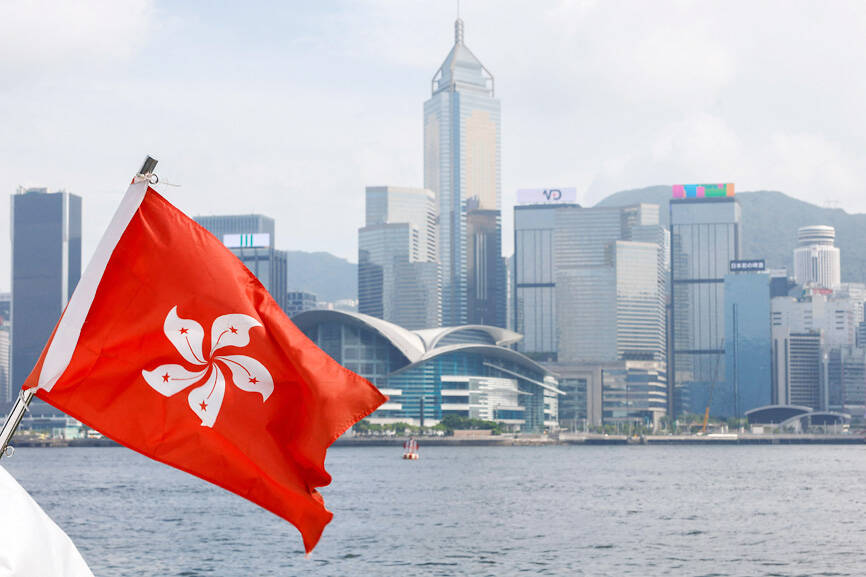The government plans to introduce a new category of long-term residency for Hong Kongers and Macanese to prevent Chinese infiltration, a source said on Sunday.
The proposed amendment to the Regulations Regarding Entry, Residence and Settlement Permits for Hong Kong and Macau Residents in Taiwan (香港澳門居民進入臺灣地區及居留定居許可辦法) aims to prevent Beijing’s attempts at infiltration or carrying out “united front” actions through the territories, an official said, speaking on condition of anonymity.
Late last month, the Ministry of the Interior proposed an amendment to the Regulations Governing Permits for People of the Mainland Area to Reside with Relatives, Reside Long-Term or Settle in the Taiwan Area (大陸地區人民在臺灣地區依親居留長期居留或定居許可辦法) requiring Chinese nationals seeking residency in Taiwan to prove that they have relinquished their Chinese household registration and passport.

Photo: Reuters
Currently, Chinese are not required to prove that they do not have Chinese passports or have renounced them to obtain residency.
The ministry’s proposed changes would align with the Act Governing Relations Between the People of the Taiwan Area and the Mainland Area (臺灣地區與大陸地區人民關係條例), which bans residents from holding Chinese passports or household registrations, the official said.
The Act Governing Relations with Hong Kong and Macau (香港澳門關係條例) does not require residents from the Chinese territories to renounce their passports when applying for residency, they said.
However, more than 1.5 million Chinese nationals have household registrations in Hong Kong, they said.
After Hong Kong’s National Security Law was imposed by Beijing on June 30, 2020, many Hong Kongers migrated to other countries, while many Chinese moved to the territory, the official said.
As such, more safety management measures would be implemented to scrutinize Hong Kong and Macau residents seeking to immigrate to Taiwan, they said.
Currently, Hong Kongers and Macanese can apply for settlement permits as long as they have resided in Taiwan for one year and have stayed in the country for at least 335 days, which can be a national security loophole, they said.
Under the proposed change, the system governing residence and settlement in Taiwan of Hong Kongers and Macanese would have long-term residency permits, in addition to residency permits and settlement permits, the official said, adding that the observation period for national security reasons would also be extended.
Similar to the permanent residency permits granted to foreign nationals, the long-term residency permits for Hong Kongers and Macanese would allow them to apply for jobs in Taiwan, and freely enter and exit the country, they said.
The government would try to protect those who fled to Taiwan for participating in 2019 and 2020 Hong Kong protests when implementing the new regulations, they said.

TRAFFIC SAFETY RULES: A positive result in a drug test would result in a two-year license suspension for the driver and vehicle, and a fine of up to NT$180,000 The Ministry of Transportation and Communications is to authorize police to conduct roadside saliva tests by the end of the year to deter people from driving while under the influence of narcotics, it said yesterday. The ministry last month unveiled a draft of amended regulations governing traffic safety rules and penalties, which included provisions empowering police to conduct mandatory saliva tests on drivers. While currently rules authorize police to use oral fluid testing kits for signs of drug use, they do not establish penalties for noncompliance or operating procedures for officers to follow, the ministry said. The proposed changes to the regulations require

The Executive Yuan yesterday announced that registration for a one-time universal NT$10,000 cash handout to help people in Taiwan survive US tariffs and inflation would start on Nov. 5, with payouts available as early as Nov. 12. Who is eligible for the handout? Registered Taiwanese nationals are eligible, including those born in Taiwan before April 30 next year with a birth certificate. Non-registered nationals with residence permits, foreign permanent residents and foreign spouses of Taiwanese citizens with residence permits also qualify for the handouts. For people who meet the eligibility requirements, but passed away between yesterday and April 30 next year, surviving family members

Taiwanese officials are courting podcasters and influencers aligned with US President Donald Trump as they grow more worried the US leader could undermine Taiwanese interests in talks with China, people familiar with the matter said. Trump has said Taiwan would likely be on the agenda when he is expected to meet Chinese President Xi Jinping (習近平) next week in a bid to resolve persistent trade tensions. China has asked the White House to officially declare it “opposes” Taiwanese independence, Bloomberg reported last month, a concession that would mark a major diplomatic win for Beijing. President William Lai (賴清德) and his top officials

The German city of Hamburg on Oct. 14 named a bridge “Kaohsiung-Brucke” after the Taiwanese city of Kaohsiung. The footbridge, formerly known as F566, is to the east of the Speicherstadt, the world’s largest warehouse district, and connects the Dar-es-Salaam-Platz to the Brooktorpromenade near the Port of Hamburg on the Elbe River. Timo Fischer, a Free Democratic Party member of the Hamburg-Mitte District Assembly, in May last year proposed the name change with support from members of the Social Democratic Party and the Christian Democratic Union. Kaohsiung and Hamburg in 1999 inked a sister city agreement, but despite more than a quarter-century of